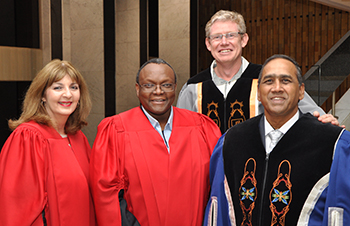Latest News Archive
Please select Category, Year, and then Month to display items
13 August 2024
|
Story Anthony Mthembu
|
Photo Sibahle Dayimani and Amandla Kulu
 Prof Peter Roseel, Managing Director of Management Consulting and Research – a spin-off of the Catholic University of Leuven in Belgium; and Prof Nicolene Barkhuizen, Director of the UFS Business School.
Prof Peter Roseel, Managing Director of Management Consulting and Research – a spin-off of the Catholic University of Leuven in Belgium; and Prof Nicolene Barkhuizen, Director of the UFS Business School.
The Business School at the University of the Free State (UFS) hosted Prof Peter Rosseel, Managing Director of Management Consulting and Research – a spin-off of the Catholic University of Leuven in Belgium – for a guest lecture during his visit to the UFS Faculty of Economic and Management Sciences (EMS).
The guest lecture took place on 19 July 2024 in the Business School Auditorium and was attended by academics from the UFS.
Reflecting on the lecture
The lecture presented by Prof Rosseel focused on how combining strategy, strategy implementation, culture transformation, leadership, and learning successfully leads to sustainable growth, creates engagement, and delivers tangible results. Throughout the lecture, Prof Rosseel spoke about how experts tend to make bad leaders and therefore stop change from happening within an organisation. In fact, he highlighted that, “Experts stop change from happening within the workplace because experts, by definition, look through the eyes of their expertise, but you cannot reduce the world to different forms of expertise, as it is holistic.” As such, he argued that to change an organisation, one must see things from the point of view of others.
Furthermore, Prof Rosseel delved deeper into the hierarchical operating model within organisations. He indicated that the above model should be one community within organisations; however, unfortunately it is not. This is because organisations are made up of several departments such as finance and human resources. As such, he regards these departments to be silos that could prove to be detrimental to organisations, as each silo can create its own culture as opposed to an organisational culture. These are some of the points he discussed throughout the lecture.
After the lecture concluded, the audience had the opportunity to engage with Prof Rosseel on his viewpoints. In fact, Lyle Markham, Academic Head of Department and Lecturer in Industrial Psychology at the UFS, was one of the audience members and described the lecture as insightful.
Prof Tim Murithi calls for Africa to design new global order
2016-06-02

From left: Prof Heidi Hudson, Head of Centre for Africa
Studies (CAS); Prof Tim Murithi, Extraordinary Professor
at CAS; Prof Lucius Botes, Dean of the Faculty of
the Humanities; and Prof Prakash Naidoo, Principal of
Qwaqwa Campus.
Photo: Stephen Collet
“What do Africans have to say about the remaking of the global order?” was the opening question of Prof Tim Murithi’s lecture which was hosted by the Centre for Africa Studies (CAS) of the University of the Free State (UFS) to celebrate Africa Day on 25 May 2016.
The annual Africa Day Memorial Lecture, entitled: Africa and the Remaking of the Global Order, doubled as Prof Murithi’s inaugural lecture. He is CAS’s newly-appointed Extraordinary Professor, as well as the Head of the Justice and Reconciliation in Africa Programme at the Institute for Justice and Reconciliation in Cape Town. He made a compelling argument for the need for Africa to exert an active influence on international narratives of peace, governance, justice, and reconciliation.
“If we are waiting for American leadership to get us out of the quagmire of a situation we are in, we will be waiting for a long time,” said Prof Murithi.
The Head of the Centre, Prof Heidi Hudson, concurred with Prof Murithi’s suggestion of devising African solutions for African problems. She quoted Audre Lorde’s well-known assertion that “The master’s tools will never dismantle the master’s house.”
Remembering 1963
Over five decades ago, on 25 May 1963, the Organisation of African Unity was formed, and was renamed the African Union in 2002. Africa Day marks this pivotal point in the continent’s history. On this day, we reflect on the continent’s journey into democracy, peace, stability and socio-economic development. It is also an opportunity to celebrate African identity and heritage.
Continent-building dialogues
The UFS Sasol Library celebrated Africa Day with a book launch. Facets of Power. Politics, Profits and People in the Making of Zimbabwe's Blood Diamonds by Tinashe Nyamunda is a reflection of some of the challenges that Zimbabwe continues to face. It details the disadvantaged position which the country finds itself in due to greed, maladministration, and corruption, despite possessing large deposits of minerals.
In celebration of Africa Month, CAS has held a series of lectures by esteemed scholars from across the globe. Earlier in the month, Prof Henning Melber presented lectures on Namibia’s independence and the African middle class. Kevin Bloom and Richard Poplak unpacked the issues surrounding Africa’s continental shift, while Prof Joleen Steyn Kotze focused on the possible fall of the African National Congress.